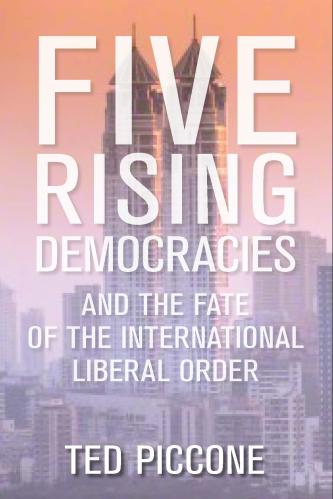There are indications that President-elect Joe Biden intends to make supporting democracy a key element of his administration’s foreign policy. This is a pragmatic decision based in an understanding of national interest that recognizes that threats to democracy overseas imperil U.S. security and prosperity at home.
Some of the most critical challenges to democracy the new administration will face on day one include the erosion of democratic rights at the hands of authoritarian regimes that have exploited COVID-19 to expand their power; the persistent and pervasive effects of expanding kleptocracy; violent conflict rooted in a breakdown of the state-society contract; and a version of governance antithetical to individual freedoms that China is proffering in tandem with opaque investment deals.
The Biden administration’s strategy to strengthen democracy will need to address each of these threats, offer a positive vision for democracy globally, and harness the full range of available U.S. tools, both diplomacy and foreign assistance. One of us, with another colleague, recently outlined a five-part agenda for doing just this.
Shoring up “citizen-centered governance” in countries that are strategically important to the United States will be central to addressing many of these challenges, and a key component of such a democracy agenda. Citizen-centered governance means that institutions and processes are open and transparent, informed by citizens’ views, and address peoples’ needs. A citizen-centered governance roadmap focuses on creating the enabling environment for responsive, responsible, and accountable government. This includes supporting reforms that allow for greater democratic participation, decentralized public management, and the provision of citizen-friendly official information.
Here, we outline why bolstering governance in priority countries can help address some of the most pressing democracy challenges and offer three ways the new administration can do so.
The governance imperative
Ineffective governance is both cause and consequence of some of the most urgent democracy challenges globally, including mounting kleptocracy, the resurgence of authoritarian rule, and protracted violent conflicts. A common denominator of poorly governed societies is the lack of citizen involvement in the decisionmaking process. Conversely, citizen engagement is associated with better governance outcomes. To advance democracy, the Biden administration needs to pair convening like-minded leaders with sustained efforts to address the root causes that preclude democracies from delivering by empowering citizens as change makers.
Kleptocratic leaders continue to enrich themselves at the expense of their citizens, siphoning public assets to offshore jurisdictions and diverting government resources to regime cronies. Weak domestic institutions, opaque government spending, and a permissive international financial environment combine to enable kleptocrats to steal public resources, which not only deprives the citizenry of much-needed resources but in many cases fuel criminal activities that can threaten U.S. interests.
COVID-19 has given kleptocrats and other authoritarian-leaning leaders an excuse to extend their reach and suppress dissent from opposition groups and civil society organizations, reducing their capacity to hold government accountable. This in turn makes it less likely that pro-democracy activists effect change, depriving the U.S. of new potential allies and partners. Poor governance in the form of absent institutional safeguards, generalized opacity, and limited oversight enables overreach.
In many weak or failing states, the breakdown of the state-society contract, the government’s inability to deliver, and predatory elites using public office for private gain continue to fuel instability.
The pandemic has exacerbated these challenges, weakening the capacity of people across the globe to make their voices heard and endangering their livelihoods in the process.
Three key priorities
As the new administration crafts its democracy agenda to address these and other challenges, it should make reinforcing citizen-centered governance a central element. Widespread disillusionment with democracy can only be addressed if the public perceives democracy as a system that actually helps solve citizens’ problems. This requires tackling the governance shortcomings that prevent citizens from directly participating in the democratic process: entrenched corruption, feeble representative institutions, and the hyper-centralization of power. To do so, the Biden administration can take three steps.
First, it should fight global corruption by eliminating impunity for kleptocrats, using open data platforms and policies to increase transparency, and re-invigorating bilateral reform assistance to bolster domestic anti-graft campaigns. The beneficial ownership transparency requirements included in the National Defense Authorization Act recently passed by Congress provide the upcoming administration with a phenomenal tool to tighten the grip on corrupt foreign nationals. To hold kleptocrats accountable, the administration should promote the adoption of similar standards internationally and enhanced asset recovery frameworks, and work with allies to improve enforcement of U.S. anti-corruption laws. The scope of anti-corruption programs and initiatives should be expanded to more seriously counter foreign malign actors’ attempts to weaponize corruption to exert undemocratic influence abroad, including by supporting investigative journalists and democratic activists in exposing capture of political and business elites. Throughout, the United States would do well to deemphasize big-bang-type legal reforms, which are often elusive, and instead prioritize and support home-grown solutions and gradual improvements.
In tandem with these efforts to bring kleptocrats to account, the U.S. should aggressively pilot and scale innovative digital tools for improving transparency and accountability in the e-governance, civic tech, and private sectors. Blockchain, data analytics, and artificial intelligence have significant potential to help reduce costs in public procurement and other sensitive sectors as well as increase the efficacy of anti-corruption measures. Machine reading, for instance, allows for the rapid analysis of public records to reveal fraudulent bids. These efforts need to be complemented with improving internet penetration in underserved areas and coupled with interventions that address political incentives, rent-seeking, and other complex corrupt behaviors that cannot be changed with technology alone. Supporting civil society in credibly imposing costs on incumbents, through improved monitoring and mobilization capacities, is a necessary step in this direction.
Revitalizing bilateral anti-corruption reform assistance in priority regions (Central America, Eastern Europe, South East Asia), especially during windows of opportunity due to domestic political changes, will help bolster domestic anti-corruption efforts. While the challenges to international assistance to anti-corruption reform in Ukraine shows the limits of this approach, the now-dismantled U.S.-backed International Commission Against Impunity in Guatemala (CICIG) provides a potential roadmap of what can be accomplished when the United States couples diplomatic pressure with support for technical assistance.
Second, the U.S. should counter executive overreach by helping parliaments become more professionalized, interconnected, and transparent, including by working with the U.S. Congress to expand efforts such as the House Democracy Partnership. Especially in presidential systems, legislatures provide executive oversight that — when endowed with full law-making and financial autonomy — can help keep the government in check. Strong judiciaries complement robust parliaments in limiting executive overreach. Beyond capacity building for judicial staff, the United States can support reforms that grant tenure to judges, which can insulate them from political pressures, and ensure judiciaries randomly assign cases, which can help avoid executive interference in judge selection.
To complement these initiatives targeted at government actors, the United States should continue equipping civil society organizations with resources to operate in difficult environments and ensure the sustainability of their efforts through fomenting collaboration with the private sector and technology companies. This includes fostering a free media environment where foreign entities can invest to support local outlets.
Finally, the administration should support effective decentralization and prioritize piloting and scaling governance solutions generated at local levels. In many emerging democracies, the gap between the center and the rest of the country is widening in terms of socio-economic indicators and the quality of government services. Helping rebalance the political weight of remote, rural, or otherwise disadvantaged areas is critical for ensuring cohesive communities, mitigating conflict, and increasing domestic support for democracy. But more can also be done to harness the extensive innovation local officials and political actors are undertaking, especially in urban areas. During COVID-19’s initial wave, for example, city-to-city exchanges were critical to share lessons and expertise. Many low-cost initiatives that were started at the municipal level, such as participatory budgeting, can help democracies deliver. This requires ensuring that subnational governments have the ability and funds to experiment with solutions.
In the face of new and old threats to freedom and prosperity globally, a reinvigorated U.S. push to strengthen citizen-centered governance abroad will fill a critical gap in the Biden’s democracy agenda as currently outlined. The COVID-19 pandemic has dramatically exposed the consequences of opaque, ineffective, and exclusionary management of public affairs in terms of human loss, negative health impacts, and economic destruction. By shoring up citizen-centered governance, the new administration will help position its partners to address current challenges and be more capable to respond to the next big crisis. By emphasizing the importance of strengthening democracy at home, the new administration will make sure the United States can lead by example and that its offers of assistance abroad are credible.
The Brookings Institution is committed to quality, independence, and impact.
We are supported by a diverse array of funders. In line with our values and policies, each Brookings publication represents the sole views of its author(s).








Commentary
Strengthening citizen-centered governance should be a core element of the Biden administration’s democracy agenda
December 16, 2020